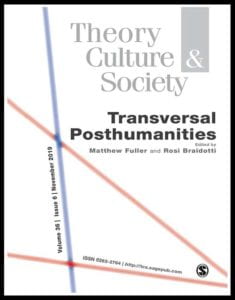 Theory Culture & Society is pleased to announce that the long-awaited Special Issue on the Transversal Posthumanities (Vol. 36. Issue 6) has now been published. The issue is edited by Goldsmiths’ Matthew Fuller and the world- famous theorist Rosi Braidotti.
Theory Culture & Society is pleased to announce that the long-awaited Special Issue on the Transversal Posthumanities (Vol. 36. Issue 6) has now been published. The issue is edited by Goldsmiths’ Matthew Fuller and the world- famous theorist Rosi Braidotti.
The Posthumanities is the name emerging to frame the wide range of fields of research that operate in a transdisciplinary way, drawing on the humanities and beyond, to make sense of contemporary culture, politics, society and knowledge. This shift to the Posthumanities is prompted in particular by a sense that many of the problems we face are set up by the mistaken understanding that the human is, or should be, at the centre of everything. Processes underway in technology and in ecology suggest that we need to look beyond the horizon of our own species in order to adequately think about the present.
To these ends, the Transversal Posthumanities special issue of Theory Culture and Society, edited by Rosi Braidotti of Utrecht and Matthew Fuller of Goldsmiths, sets out to take the pulse of this wider general tendency in contemporary research by bringing together researchers dealing with the question of the Posthumanities in relation to particular sciences, such as mathematics, computing or ecology and the practices of technology that embody these. As Braidotti and Fuller say in their introduction to the issue, the Posthumanities provides a new grounds for knowledge that is necessarily transversal, that is: bridging different lines of enquiry, responding to crises in knowledge, but also relishing potential for inventiveness that flows from them.
Aside from an extensive introduction to the stakes of the issue, articles by a range of authors cover the following: a mapping of the Posthumanities by Braidotti; a ‘Letter to Turing’ evaluating the profound intellectual significance of Alan Turing from mathematician Giuseppe Longo; a reflection on the nature of artificial intelligence as a form of reasoning, from Luciana Parisi of Duke University; a proposal for understanding “Digital Subjects” in the era of Big Data from cultural theorist Olga Goriunova; an argument for the practice of scientific doubt in the development of computational technology from social theorist Louise Amoore; Fuller collaborates with information security researcher Nikita Mazurov to expose in detail the way in which a controversial film leak was tracked down; and animal studies scholar Eben Kirksey makes an ethical account of relations between species, proposing multi-species thinking as a necessity for the present. All of these articles share a sense of urgency, but also of invention, something that is opportune as we face the coming decades.
November’s Special Issue on Transversal Posthumanities is available now: https://journals.sagepub.com/toc/tcsa/36/6
Theory Culture & Society Website https://www.theoryculturesociety.org/tcs-special-issue-transversal-posthumanities/